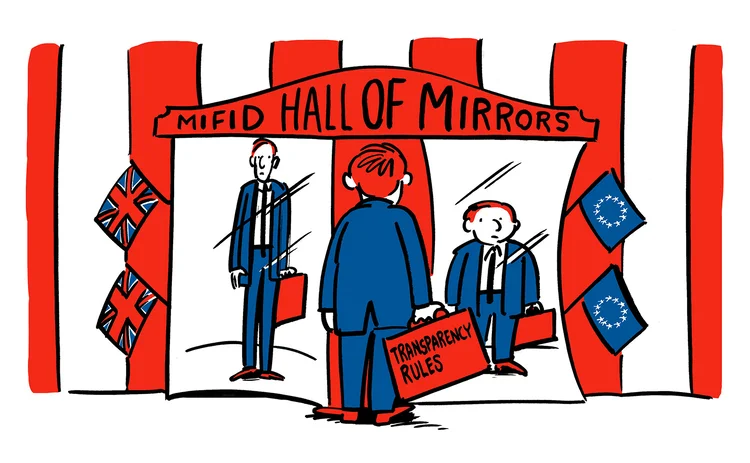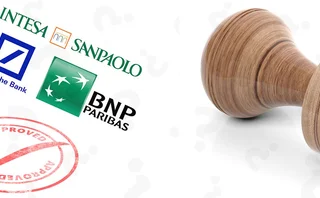
HM Treasury’s Brexit surprise
Statutory instruments throw up unwieldy divergence in Mifid II and Emir rules

Brexit has been the political thriller of the year, promising frequent and dramatic plot twists at almost every turn. Now, one of the chapters meant to be the least controversial – the part where HM Treasury copies and pastes all European law into UK law – is throwing up nasty surprises for bankers.
Since August 2018, HM Treasury has been publishing a series of draft statutory instruments converting EU regulations into UK law. The task should be straightforward – effectively a copy-and-paste of EU rules and a find-and-replace of references to the EU and powers bestowed upon European regulatory agencies. Nothing else is supposed to change.
In practice, those apparently minor tweaks could have extreme consequences for the way the law will work post-Brexit.
For example, October’s publication of statutory instruments implementing the Markets in Financial Instruments Regulation – sister to the Directive, known as Mifid II – casts doubt over when trades are relieved from transparency requirements.
Mifir requires firms to publicly disclose trades executed on trading venues as well as those transacted with systematic internalisers and investment firms off-venue. Lists governing which instruments must be reported when traded off-venue and when trades are deemed illiquid or large enough to be granted deferrals and waivers from public disclosure, are set to significantly alter under the statutory instrument.
Under the new regime, UK lists would be generated without data from EU venues, while EU lists would exclude data from UK venues. The result is that UK and EU lists could be set to diverge – perhaps dramatically.
The UK’s Financial Conduct Authority has powers to throw the calculation process out of the window and simply align the UK’s transparency regime with the EU’s. But market participants fear perfect alignment will be impossible unless the FCA’s counterpart in the EU – the European Securities and Markets Authority – is given equivalent powers.
A second statutory instrument implementing the European Market Infrastructure Regulation also threatens to throw up operational problems for UK pension funds.
Due to the lapse of an exemption from the EU’s clearing obligation and with negotiations between EU lawmakers to renew the exemption still ongoing, HM Treasury decided not to renew the exemption until revisions have been approved by EU lawmakers.
Those negotiations, however, have stalled, meaning UK pension funds could be required to start clearing swaps subject to the clearing mandate when trading with EU counterparties. The problem would also occur in the opposite situation – if an EU pension fund trades with a UK bank.
The implication for banks is that they’ll have to set up implementation projects to align with the new UK regime.
“Brexit does not just mean we have to think only about setting up new entities in the EU. We also need to be mindful of the way it is impacting the home entity as well,” says a market structure expert at a UK investment bank.
With no-deal still on the table and Brexit less than four months away, it will be almost impossible for banks and pension funds to implement new systems in time to meet the new requirements.
Only users who have a paid subscription or are part of a corporate subscription are able to print or copy content.
To access these options, along with all other subscription benefits, please contact info@risk.net or view our subscription options here: http://subscriptions.risk.net/subscribe
You are currently unable to print this content. Please contact info@risk.net to find out more.
You are currently unable to copy this content. Please contact info@risk.net to find out more.
Copyright Infopro Digital Limited. All rights reserved.
You may share this content using our article tools. Printing this content is for the sole use of the Authorised User (named subscriber), as outlined in our terms and conditions - https://www.infopro-insight.com/terms-conditions/insight-subscriptions/
If you would like to purchase additional rights please email info@risk.net
Copyright Infopro Digital Limited. All rights reserved.
You may share this content using our article tools. Copying this content is for the sole use of the Authorised User (named subscriber), as outlined in our terms and conditions - https://www.infopro-insight.com/terms-conditions/insight-subscriptions/
If you would like to purchase additional rights please email info@risk.net
More on Regulation
One year on, regulators still want a cure for bank runs
Broad support for higher outflow assumptions on uninsured deposits, but that won’t save insolvent banks
Watchlist and adverse media monitoring solutions 2024: market update and vendor landscape
This Chartis report updates Watchlist monitoring solutions 2022 and focuses on solutions for sanctions (name and transaction) screening and monitoring adverse media and its related elements
Basel Committee reviewing design of liquidity ratios
Focus on LCR and NSFR after Silicon Valley Bank and Credit Suisse, but assumptions may not change
Risk, portfolio margin, regulation: regtech to the rescue
A white paper outlining the complexity of setting the course for risk, margin and regulation
Prop shops recoil from EU’s ‘ill-fitting’ capital regime
Large proprietary trading firms complain they are subject to hand-me-down rules originally designed for banks
Revealed: the three EU banks applying for IMA approval
BNP Paribas, Deutsche Bank and Intesa Sanpaolo ask ECB to use internal models for FRTB
FCA presses UK non-banks to put their affairs in order
Greater scrutiny of wind-down plans by regulator could alter capital and liquidity requirements
Industry calls for major rethink of Basel III rules
Isda AGM: Divergence on implementation suggests rules could be flawed, bankers say
Most read
- SG trader dismissals shine spotlight on intraday limit controls
- Basel Committee reviewing design of liquidity ratios
- Too soon to say good riddance to banks’ public enemy number one








